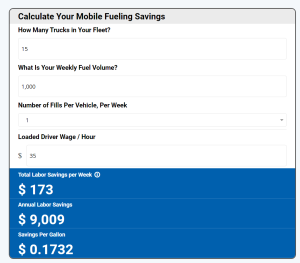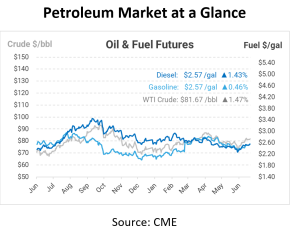
5 Reasons Why Mobile Fueling Improves Fleet’s Safety and Security
In the world of fleet management, mobile fueling is gaining traction as a transformative solution. Although relatively new to some operators, the benefits of mobile fueling are proving to be significant, making its adoption a strategic move for fleet managers. It eliminates the need for vehicles to make detours for refueling, enhancing productivity, saving time, and reducing mileage.
A study by Geotab analyzed six months of data from over 150,000 vehicles across the U.S., revealing that drivers, on average, travel two miles out of their way, spend 8 minutes at the pump, and typically refuel with one-third of a tank remaining. These detours add over 20 minutes to each trip, leading to inefficiencies and increased costs.
In today’s article, we will explore five compelling reasons why mobile fueling is an excellent choice for fleet managers aiming to optimize operations, safeguard assets, and reduce downtime.
-
Operational Efficiency and Safety
Businesses, especially those managing large fleets, stand to benefit immensely from mobile fueling. By bypassing traditional fuel stations, companies can eliminate unnecessary travel, significantly saving time and enhancing safety. It offers direct delivery of fuel to vehicles at work sites or during off-peak hours, ensuring that operations continue without interruptions. This optimization reduces idle time and maximizes resource utilization, directly impacting the company’s bottom line.
-
Environmental and Economic Impact
Mobile fueling also offers environmental benefits. According to Geotab findings, gas station stops release an average of 3 pounds of CO2 into the atmosphere each month. By reducing the number of trips to fuel stations, companies can significantly lower fuel consumption and, consequently, vehicle emissions.
Moreover, stringent environmental and safety regulations often limit the amount of fuel that can be stored on-site. Mobile fueling eliminates the need for large on-site storage tanks, reducing the risk of fuel spills and the associated environmental hazards.
-
Combating Fuel Theft and Ensuring Compliance
Fuel theft is a persistent challenge in traditional fueling setups. It addresses this issue by removing the fueling task from the driver, thereby eliminating the opportunity for theft.
-
Enhancing Transparency and Flexibility
Mobile fueling brings improved transparency to fuel management with detailed and streamlined invoicing systems. Suppliers will provide comprehensive transaction records that minimize discrepancies, enhance transparency, simplify expense tracking and fuel tax reporting, and offer more accurate budgeting and financial management.
Not to mention, the flexibility of mobile fueling allows companies to tailor fuel delivery schedules to their specific operational needs, reducing downtime and increasing overall efficiency.
-
Boosting Productivity and Employee Satisfaction
The convenience extends to the drivers and operational teams. With fewer trips to fuel stations, no waiting in lines, and guaranteed fuel quality, drivers experience less frustration and greater job satisfaction. This enhanced efficiency not only boosts productivity but also ensures that schedules are adhered to, contributing to operational success and improved employee assurance.
Is Mobile Fueling Right for You?
Switching to mobile fueling is a smart move for fleet owners looking to simplify operations and boost their bottom line. As companies recognize these advantages, it is becoming a game-changer in the world of fleet management.
So, if you haven’t already, it’s time to start refueling your vehicles and machinery through Mansfield’s Mobile Fueling Services. Mansfield offers a free tool that lets you calculate your potential labor savings if your business converts to a mobile fueling service.
Contact an expert at Mansfield to learn more about this cost-saving opportunity.


This article is part of Daily Market News & Insights
Tagged:
MARKET CONDITION REPORT - DISCLAIMER
The information contained herein is derived from sources believed to be reliable; however, this information is not guaranteed as to its accuracy or completeness. Furthermore, no responsibility is assumed for use of this material and no express or implied warranties or guarantees are made. This material and any view or comment expressed herein are provided for informational purposes only and should not be construed in any way as an inducement or recommendation to buy or sell products, commodity futures or options contracts.





